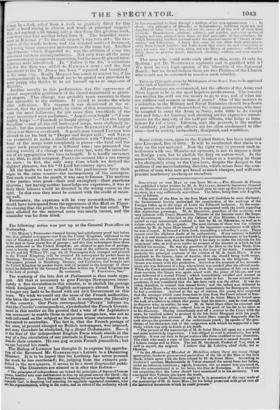DISCOVERY OF THE MAN IN THE IRON MASK.—The Gazette de
France has published a letter written by M. A. BILLIARD, formerly Secretary-General to the Minister of the Interior, which would seem to clear up this long-cherished mystery, in a way sufficiently marvellous. The letter, being done into English, runs as follows.
"The secret of the Man in the Iron Mask will doubtless be soon disclosed ; the Government having authorized the examination of the archives of the Foreign Office up to the reign of Louis the Fifteenth inclusive. In the mean- time, permit me to relate how I came to be acquainted with the truth regarding this mysterious personage. M. de Hauterive, guardian of the archives, was very intimate with Count Montalivet, Minister of the Interior under the Impe- rial Government. Attached to the Cabinet of this Minister, I was often re- quired to copy manuscripts confided to him by M. de Hituterive, as well as to collate others with the originals. The most curious of these was the relation written by M. de Saint Mars himself of the important commission with which he was charged. It formed a little book, resembling a schoolboy's copy. There cannot exist the slightest doubt of its authenticity. If my memory is faithful (for it is now twenty-two years since I had this precious document in my hands), M. de Saint Mars said, that he thought it his duty to make the relation for his conscience' sake, as well as to render an account of the manner in which he had fulfilled his mission. He was the guardian of the Man in the Iron Mask, from the moment of the latter's birth down to the hour of his death. I remember perfectly the principal contents of the relation of M. de Saint Mars. It was predicted to the Queen, Anne of Austria, that she should bring forth twins, which should one day be the cause of great troubles in the kingdom. The Queen was struck with this prediction. Arrived at the moment of her accouch- merit, she was delivered of a boy, whose birth was verified after the official made. When the Court attendants had retired, with the exception of her own imme- diate servants, the Queen was again seized with the pains of labour, and was soon delivered of a second Prince ; which immediately recalled and seemed so far to verify the prediction which had been made to her. In our ancient juris- prudence, it was considered that the last-born twin was the eldest. It was de- cided, therefore, to conceal this second birth ; and the infant was delivered to M. (le Saint Mars, who was ordered to depart immediately for Boargogne, where he had a residence. Arrived at the age of sixteen, the young man suspected that the messages which came from time to time from the Court related to him- self. Profiting by a momentary absence of M. de Saint Mars, he forced open
the lock of a cabinet in which that person kept his letters ; and he read enough to discover who, in reality, he was. M. de Saint Mars when he returned and found what had taken place, ordered him on the peril of his life to be silent as to his discovery. Having immediately sent off a courier to the Court with the news, he received orders to proceed to the Isle Saint Margaret with his pupil,
who then became his prisoner. M. de Saint Mars repeats frequently that be took always the greatest care of the unfortunate youth : he speaks of the gen- tleness of his character, and of the resignation with which be supported a cap- tivity which was only to finish at his death.
"The perusal of the manuscript of M. de Saint Mars left upon me a profound and most melancholy impression. I was obliged to read it attentively, but with rapidity. It was our duty to forget matters like these confided to our discretion. The clerk who made a copy of this important document is named Arnyot ; and I believe resides still in Paris. The late M. Goubault, Prefect of Var, read, as well as myself, the original. 1 believe that 41. Labiche, chief clerk, did so likewise.
"In the Memoirs of Marshal de Richelien, where there are many things apocryphal, Soulavie gives several particulars of the life of the Man in the Iron
Mask, which agree with the facts related by M. de Saint Mars. According to Soulavie's account, Mademoiselle de Valois obtained the secret from her father. under an infamous condition ; wirich, however, she no sooner was possessed of, than she communicated it to her lover, the Due de Richelieu. It is therefore not surprising that the latter should have mentioned it to his secretary. I am convinced that Voltaire also knew the truth.
" The son of Count Montalivet ought to be in possession of the copy made of the manuscript of M. de Saint Mars; for his father preserved withgreat care all she historical documents which he could procure."


























 Previous page
Previous page